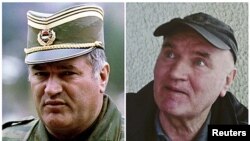After sixteen years in hiding, Ratko Mladić, the former Bosnian Serb army commander wanted for genocide, crimes against humanity, and other violations, was apprehended by Serbian law enforcement in a relative’s home in northern Serbia. After a judicial process in Serbia, he was transferred May 31 to the U.N. International Criminal Tribunal for the former Yugoslavia, or ICTY.
Mladić was one of the last of the major figures accused of war crimes in the 1992-95 Yugoslav conflicts to evade capture. Goran Hadžić, a Croatian Serb, also indicted by the ICTY for crimes against humanity and serious war crimes, remains at large.
Mladić is an ethnic Serb who became the leader of Bosnian Serb forces during the brutal 1992-95 war in Bosnia and Herzegovina. In July 1995, Mladić was indicted by the ICTY, for genocide, crimes against humanity, and numerous war crimes. Most of the charges stem from two incidents: the 46-month siege of Sarajevo which included a sniping campaign against the city's civilians, and the Srebrenica genocide, the largest mass murder in Europe since World War II.
In July 1995, Bosnian Serb troops under Mladić’s command overran the town of Srebrenica, a United Nations-designated protected area packed with tens of thousands of Bosnian Muslims who had sought shelter there. Mladić’s troops rounded up the population, deported the women and youngest children, and then systematically massacred all males over the age of 15.
Mladić personally visited almost every site where the doomed captives were eventually killed. Serb forces then obstructed future investigations by damaging and then repeatedly re-burying the remains in mass graves. Mass graves are still being uncovered to this day, as is the work of identifying the victims and laying them to rest.
"Ratko Mladić ordered the systematic execution of some 8,000 unarmed men and boys in Srebrenica," said President Barack Obama in a written statement. "Today, he is behind bars. I applaud President [Boris] Tadić and the Government of Serbia on their determined efforts to ensure that Mladić was found and that he faces justice.
"Today is an important day for the families of Mladić’s many victims, for Serbia, for Bosnia, for the United States, and for international justice. While we will never be able to bring back those who were murdered, Mladić will now have to answer to his victims, and the world, in a court of law. In Bosnia, the United States – our troops and our diplomats – led the international efforts to end ethnic cleansing and bring a lasting peace. On this important day, we recommit ourselves to supporting ongoing reconciliation efforts in the Balkans and to working to prevent future atrocities. Those who have committed crimes against humanity and genocide will not escape judgment.
"May the families of Mladić’s victims find some solace in today’s arrest, and may this deepen the ties among the people of the region."
End Of The Road For Ratko Mladic

Ratko Mladić, the former Bosnian Serb army commander wanted for genocide, crimes against humanity, and other violations, was apprehended by Serbian law enforcement.



